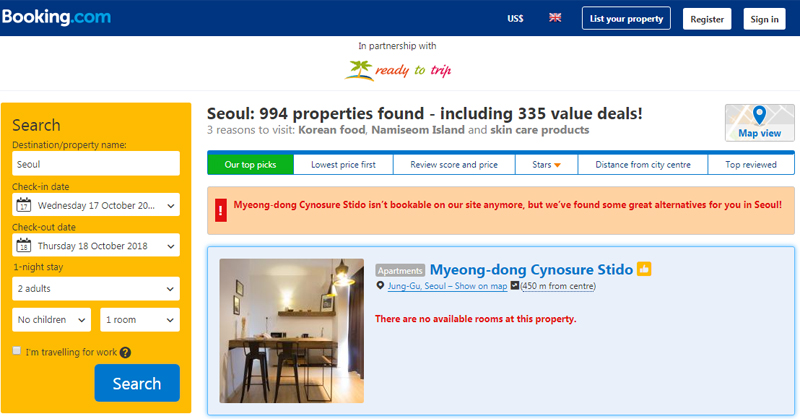How a South Korean Stay Went Wrong – And What You Should Do
Planning a getaway? Think twice before you click that “book now” button. A recent case in Malaysia shows that sometimes the smallest details can turn into a full‑blown money loss.
What went down
- Meet Xavier Aranggoi Maurice – a guy from Malaysia who dreamed of a chill stay in Seoul’s buzzing Myeong‑dong.
- He set his sights on two apartments that could host eight friends. Deadlines: 10/11–10/19.
- Two months before the trip, the apartment’s owner, a man known as Eric, called Xavier up and demanded the payment.
- Xavier was told he had 24 hours to drop the money or lose the spot.
- He paid RM 4,878.50 (≈ S$ 1,616.50) under the promise that the reservation would hold.
- When the trip rolled around, the place was unavailable – Eric had vanished and the money was gone.
What you can learn
When booking accommodations, especially overseas, don’t let yourself become a pay‑first, see‑later victim. Here’s a quick cheat‑sheet:
- Use reputable sites. Check for secure payment options and read real reviews – not just the glossy ones.
- Keep records. Screenshot every communication, confirmation, and payment receipt. It helps if you need to prove you were duped.
- Ask for a hold or deposit. Legitimate hosts usually let you pay a small portion now and the rest later.
- Don’t ignore red flags. A rapid payment deadline can be a sign of a scam.
Remember: a great adventure starts with a safe booking. If someone seems off, trust your gut – it might just save you from becoming the next headline in a travel caution story.

When a “Booking” Turns Into a Bust
Picture this: It’s early August, and a casual traveler named Xavier is following the usual plan—pick a cozy spot, pay through Alipay, sleep soundly.
The Money‑Transfer Drama
- On August 17, Xavier transfers the required amount to the property owner, Eric, using Alipay.
- Within minutes, Eric acknowledges the payment—but then…
Vanishing Act
After confirming the booking, Eric pulls a classic “silent treatment.” He stops answering calls, messages, or any attempts by Xavier to double‑check if the place is ready to host.
Booking.com’s Unexpected Twist
- Three weeks later, the platform’s system flips the switch: Booking.com cancels the reservation. No heads‑up, just a notification.
- Xavier, baffled, texts Eric for an explanation.
And the Boss‑catch
Eric’s reply reads: “Hello, please contact the property owner about details. I am not working here anymore.” A perfect hide‑and‑seek of a disappearing landlord.
Spreading the Word
Feeling ripped off and unwilling to let others fall into the same trap, Xavier posts a warning on Facebook to alert fellow travelers to be wary of this potential scam.
Final Thoughts
In the world of online bookings, a swift payment and a polite “yes” can quickly become a ghost. Stay alert, double‑check owners, and if something feels off, don’t be surprised when you discover the shadow landlord has left town for good.

Hold Up—What’s Up With That Mystery Getaway?
So, picture this: you’re scrolling through TripAdvisor when you notice a string of total drama about a place called Cynosure Stido. Fast‑forward three months and there are 18 reviews shouting, “It’s a scam!” Every single one.
The Fallout
- Those heated critiques? Gone—TripAdvisor wiped them out.
- And booking.com didn’t hold back either—this spot has been delisted.
- But the buzz didn’t stop there. Fellow travelers on a forum thread kept coming in, saying they’d been tricked just like everyone else.
Bottom Line
It’s a textbook case of a vacation gone wrong. If you’re thinking of booking that place, maybe best to skip it and save yourself the headache.

Snap from the Travelsphere
Ever seen a photo that’s more about the moment than a TripAdvisor review? This little screengrab is exactly that—an image that says, “You’re in the right place, no words needed.”
Why this Snapshot Rocks
- Instant info: Spot the must‑see spots without scrolling through endless pages.
- Click‑worthy: The crisp image catches the eye better than any text can.
- Shareable vibes: Perfect for posting on socials—just add a witty caption.
Quick Tips to Use This Photo
- Save the image: Right‑click and choose “Save Image As.”
- Round it up: Add a border or caption tweak to personalize.
- Use it wisely: Tag it in travel blogs or Instagram stories for maximum buzz.

When an Apartment Disappears: The Booking.com Mystery
Guests Show Up, but the Place is MIA
Picture this: you arrive at an address posted on Booking.com, ready to soak in a cozy stay, and all you find is an empty lot. Some travelers raved about the sheer inconvenience—“I walked two blocks and still couldn’t spot the listing!”—while others went straight to the “refund” button, only to see it stay stubbornly on the blacklist.
Booking.com Steps In
- Property Removed: “In this rare and specific instance, the property has been removed from Booking.com,” the company said, saying they’ve already processed a full refund for the affected guests.
- Security Vibes: “As a leading e-commerce company, we’re constantly tightening security to protect our customers and partners,” the spokesperson added with a calm confidence.
TripAdvisor Follows Suit
TripAdvisor didn’t stand idle either. Once the community flagged the listing, they swiftly yanked it down.
- Spotlight on Integrity: “This property should never have been on TripAdvisor’s platform,” the platform’s spokesperson said.
- Future Proofing: “We’re constantly scrutinizing our systems and reviewing processes to prevent repeat incidents,” they promised.
What’s Next?
As the internet ponders whether user‑generated reviews are foolproof, the tech giants are on a relentless quest to make sure you’re not booking an apartment that ends up being an “appartment” of nothing. So, the next time you’re scrolling through a listing, keep an eye out for a prompt that looks a bit suspicious—just in case the address turns out to be a mirage.




